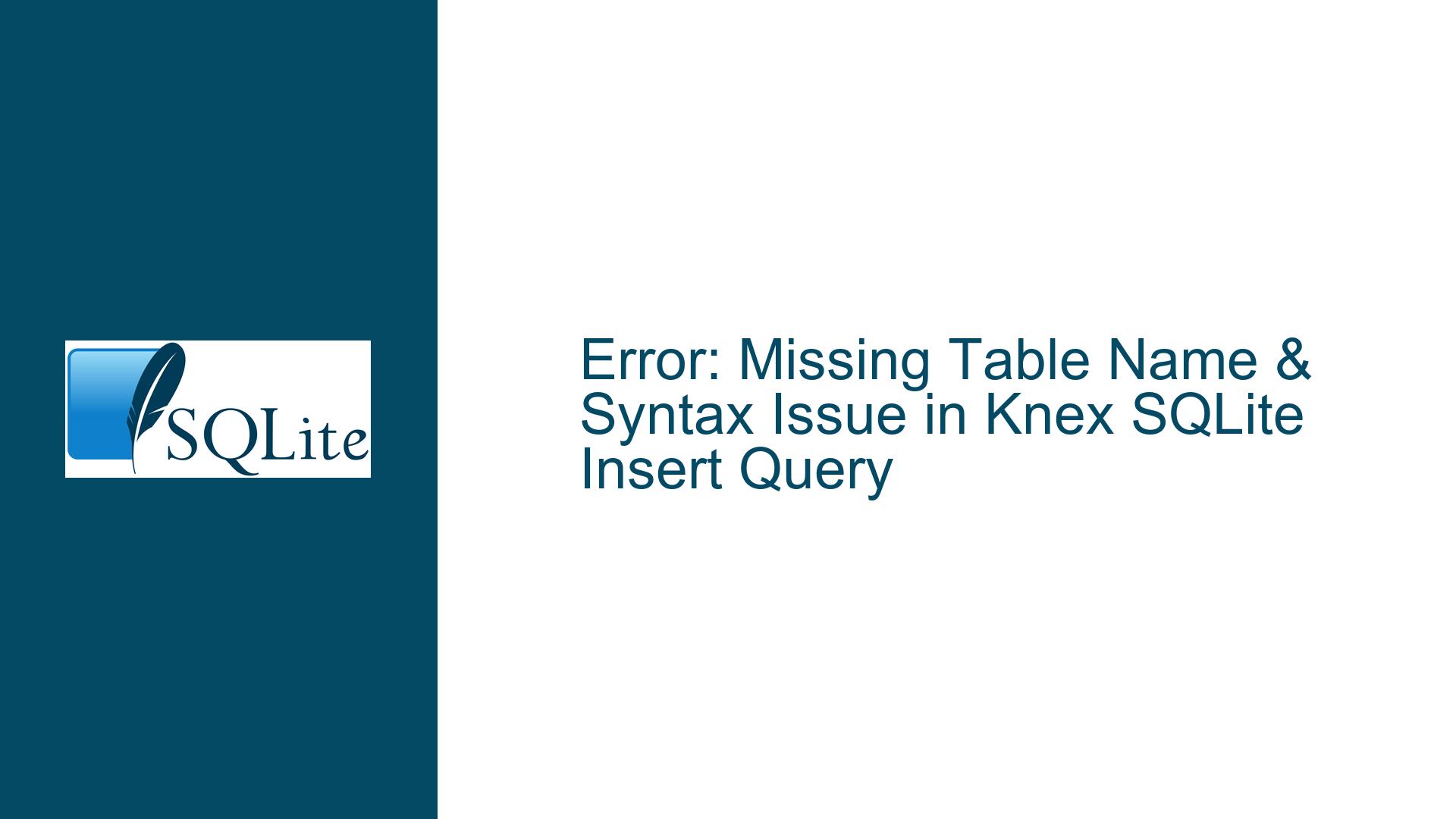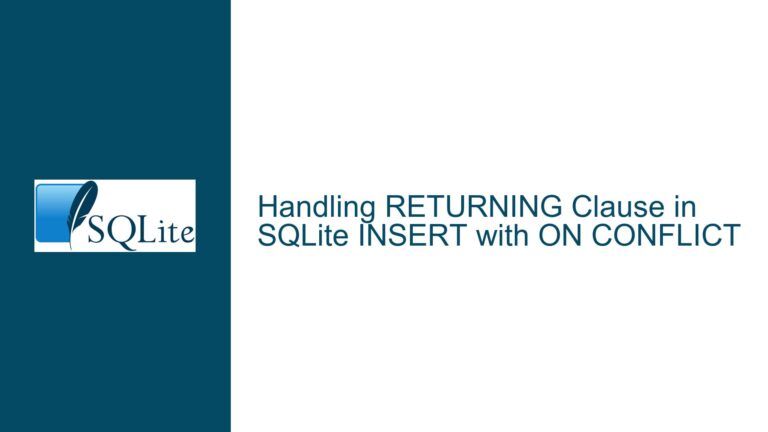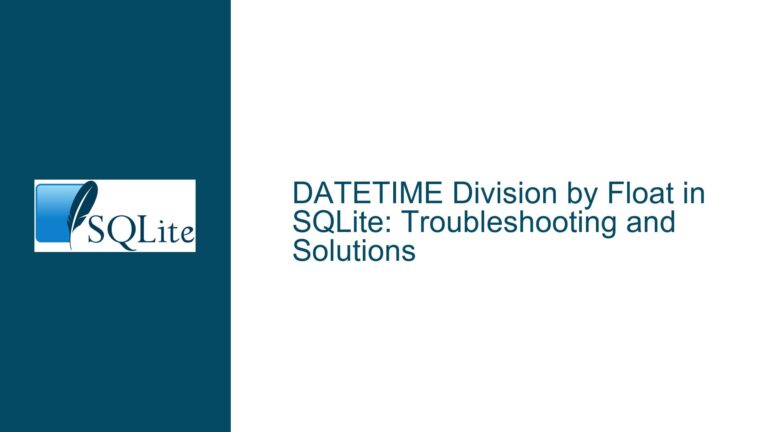Error: Missing Table Name & Syntax Issue in Knex SQLite Insert Query
Issue Overview: Missing Table Name in Insert Query Leading to Syntax Error
The core issue revolves around an SQL syntax error occurring during an insert operation using Knex with SQLite. The error message explicitly indicates a problem near the opening parenthesis ( in the generated SQL statement:
insert into (`name`, `state`) values ('Caxias do Sul', 'RS') returning `id`
This SQL is syntactically invalid because the table name is missing after the insert into clause. SQLite expects the table name to immediately follow insert into, but the generated query skips it entirely, leading to a parsing failure.
The secondary warning about SQLite not supporting default values (useNullAsDefault) is a red herring in this context. While the warning suggests a configuration adjustment, it is unrelated to the immediate syntax error. The primary focus should be on resolving the missing table name, as this is the root cause of the query failure.
The code uses knex(ETableNames.city).insert(...), where ETableNames is an enum or object mapping table names. If ETableNames.city does not resolve to a valid string (e.g., it is undefined, empty, or improperly formatted), Knex will generate an insert statement without a table name, resulting in the observed error.
Possible Causes: Invalid Table Name Reference or Configuration
Undefined or Empty Table Name in
ETableNames
The enumETableNamesmay not have a valid entry forcity. For example:export enum ETableNames { city = '', // Empty string }If
ETableNames.cityresolves to an empty string, Knex will generate aninsert into ()clause, omitting the table name.Typographical Error in Enum or Import
The enum propertycitymight be misspelled (e.g.,citiinstead ofcity), or the import path forETableNamescould be incorrect. This would causeETableNames.cityto resolve toundefined, leading Knex to omit the table name.Incorrect Escaping or Formatting
If the table name contains special characters or spaces, it must be wrapped in backticks or quotes. For example, ifETableNames.cityreturnscity table(with a space), Knex should generateinsert into `city table` (...). Failure to escape such names properly can lead to syntax errors.Misconfigured Knex Connection or Pool
While less likely, an invalid Knex configuration (e.g., corrupted connection settings) could theoretically interfere with query generation. However, the presence of theuseNullAsDefaultwarning confirms that the configuration is partially loaded.
Troubleshooting Steps, Solutions & Fixes
Step 1: Validate the Value of ETableNames.city
Add temporary logging to inspect the value of ETableNames.city at runtime:
// In the create function
console.log('Table name:', ETableNames.city); // Check output during execution
If the output is empty or undefined:
- Verify the enum definition in
ETableNames.ts:export enum ETableNames { city = 'city', // Ensure this is a valid string } - Confirm the enum is imported correctly:
import { ETableNames } from '../../ETableNames'; // Correct path
Step 2: Adjust Knex Query to Hardcode Table Name (Temporary Test)
Replace ETableNames.city with a hardcoded string to isolate the issue:
// In create.ts
const [result] = await knex('city').insert(city).returning('id');
If the query succeeds, the problem lies with ETableNames. If it fails, proceed to Step 3.
Step 3: Verify SQLite Version Compatibility with RETURNING Clause
SQLite added support for the RETURNING clause in version 3.35.0 (March 2021). If the runtime environment uses an older version, the returning('id') method will fail. Check the SQLite version:
SELECT sqlite_version();
If the version is below 3.35.0:
- Modify the query to use
last_insert_rowid():const result = await knex('city').insert(city); return result[0]; // Returns the last inserted ID
Step 4: Resolve useNullAsDefault Warning
While unrelated to the syntax error, address the warning by ensuring all non-nullable columns have explicit default values or are included in the insert payload. Configure Knex to suppress the warning:
// In knex configuration
useNullAsDefault: true, // Already set; ensure no overrides elsewhere
Step 5: Validate Table Schema and Column Names
Ensure the city table exists with columns name and state:
CREATE TABLE city (
id INTEGER PRIMARY KEY AUTOINCREMENT,
name TEXT NOT NULL,
state TEXT NOT NULL
);
Mismatched column names (e.g., state vs. state_code) will cause insertion failures.
Final Solution
After confirming ETableNames.city resolves to 'city', the corrected query will be:
insert into `city` (`name`, `state`) values ('Caxias do Sul', 'RS') returning `id`
This addresses the syntax error and allows the insert to proceed. If using an outdated SQLite version, remove the returning clause and use last_insert_rowid() instead.






